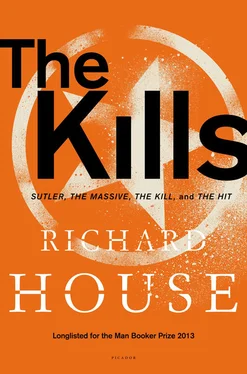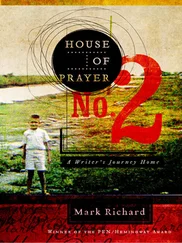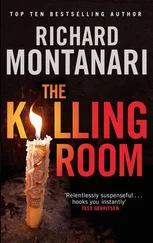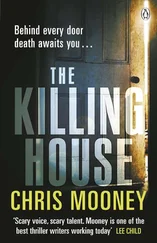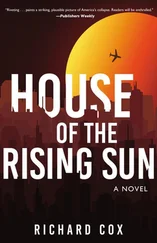Richard House - The Kills
Здесь есть возможность читать онлайн «Richard House - The Kills» весь текст электронной книги совершенно бесплатно (целиком полную версию без сокращений). В некоторых случаях можно слушать аудио, скачать через торрент в формате fb2 и присутствует краткое содержание. Год выпуска: 2013, Издательство: Picador, Жанр: Современная проза, на английском языке. Описание произведения, (предисловие) а так же отзывы посетителей доступны на портале библиотеки ЛибКат.
- Название:The Kills
- Автор:
- Издательство:Picador
- Жанр:
- Год:2013
- ISBN:нет данных
- Рейтинг книги:3 / 5. Голосов: 1
-
Избранное:Добавить в избранное
- Отзывы:
-
Ваша оценка:
- 60
- 1
- 2
- 3
- 4
- 5
The Kills: краткое содержание, описание и аннотация
Предлагаем к чтению аннотацию, описание, краткое содержание или предисловие (зависит от того, что написал сам автор книги «The Kills»). Если вы не нашли необходимую информацию о книге — напишите в комментариях, мы постараемся отыскать её.
The Kills — читать онлайн бесплатно полную книгу (весь текст) целиком
Ниже представлен текст книги, разбитый по страницам. Система сохранения места последней прочитанной страницы, позволяет с удобством читать онлайн бесплатно книгу «The Kills», без необходимости каждый раз заново искать на чём Вы остановились. Поставьте закладку, и сможете в любой момент перейти на страницу, на которой закончили чтение.
Интервал:
Закладка:
Ford automatically touched his face. ‘It isn’t anything interesting.’
‘So where are you going? Narapi?’
‘I haven’t decided.’
The boy shied away from the smoke rising from the brazier. ‘If you want to stay in Narapi there’s a place called the Maison du Rève. It’s good. Nothing fancy. Doesn’t have a pool or anything, just two or three rooms around a courtyard. And it’s reasonable. I have the address. I’m going through Narapi to do some climbing, but I’ll be back by the weekend and this is where I’ll be staying.’ The boy took out his mobile and while he talked about himself Ford pointedly stood up to go. A copy of the Herald stuck out of the boy’s bag. ‘You want this?’ The boy offered the paper. ‘There’s something in there about what I’ve been talking about. Something about the movie.’
Ford held up his hand. Thanks but no. There was nothing he cared to see in a newspaper. Nothing he needed to be told. Making his apology he stood up and said he needed to retrieve the dog tags.
* * *
Back on the coach he held the dog tags in his fist, a certainty about them that he liked. The metal, thin steel or tin, quickly warmed to his hand. His ran his finger over the ridges, double-checked that the numbers on each were correct, set them in order, then tore the paper into small pieces and let the paper drop to the floor. He threaded the tags onto a small-ball chain which he wore about his neck. The weight of them was reassuring, pleasing, an indication that things were going well. He should email these numbers to himself. Store the numbers where he would not lose them. Better still, he should get online and transfer the money. He wondered if the money was really there, waiting.
* * *
The outskirts of Narapi appeared modern, a new road flanked with boxy concrete houses. Wisps of grass sprouted on unfinished walls. The town itself lay in a long hollow interrupted by an oblong flat-topped plug of rock: a bald stone nub.
The student turned and pointed. ‘It looks something like a meteor, no?’
Ford asked how far it was to the next town and the boy guessed that Birsim was another hour, maybe only forty-minutes or so. Eager to sleep in a real bed, he decided to stay in Narapi.
As they waited for a place at the terminus Ford asked the student to repeat the name of the hotel. From the back of the coach came singing and clapping. The boy tore a corner from the notebook and wrote down the hotel’s number and address, and Ford felt some relief that his journey, for now, was over. The town was far from the border, remote and secure.
‘I might see you if you’re still there this weekend.’ He held up his hand. ‘Eric,’ he said, ‘remember, Eric.’
A child with a bandage at his neck signalled the coach into the bay.
* * *
The student watched Ford as the coach pulled away. Ford checked the label on his rucksack, although he could tell from the weight that he was carrying his own. A few saplings planted either side of the square wilted in the late-afternoon sun; their small bay-shaped leaves hung down, crackling in a light wind. As he walked through the town Ford realized that there was no military presence: no Humvees, no roadblocks, no patrols scattered cautiously across the streets. It wasn’t that he missed them, but he noticed they were absent. As he walked the dog tags lightly swung against his chest.
2.7
On the Thursday night Anne received two messages. The first, a message on her voicemail, reminded her of a seven o’clock booking at John’s in the East Village. You’re late. You’ve forgotten, haven’t you? Her friend’s voice bristled with irritation. Something had happened, she said, and it needed to be talked out. The second message, a text message, came from Anne’s son, Eric, who was travelling in Turkey.
Already in a cab heading downtown, Anne did not immediately read the message, Eric used a shorthand she didn’t always understand, and her glasses, tucked into the side pocket of her small bag, were temporarily misplaced. Unable to read the text, she stored the message, listened a second time to the voicemail, then, with a small apology, asked the driver how long it would take to get downtown.
The driver shrugged. ‘Fifteen, if we’re lucky. Maybe twenty? Who knows, right?’
In two days Anne would depart for Rome. She had organized her last week in New York with care, so it irritated her that she would forget this one appointment and took it as something subconscious, a kind of undeliberate/deliberate gesture. More and more, Marian’s emergencies coincided with Anne’s departures.
She called her friend. ‘I’ll be with you in ten minutes. I promise.’
‘Nowhere is ten minutes away.’ Marian didn’t disguise her irritation. ‘Well, hurry because I’ve found you somewhere. We’re talking Malta. Marsaskala. Town on one side, uninterrupted sea view on the other. You’ll love it. An honest-to-god palazzo, totally private, so spacious you’ll think you’ve lived life in a closet. You can have parties, and you can have it as long as you like. This place is an absolute find. A steal. Nobody knows about it. And by the way: big favour, very big. You owe me.’
The taxi took Anne alongside the park. Outside the Met couples walked down the steps, some animated, some arm-in-arm. Lights on in the building for a late opening. One wagon on the sidewalk sold pretzels and knishes. All of this familiar, quaint in a way, but still foreign: the people, the vendors. As the cab changed lanes she felt the phone vibrate in her pocket. Hearing a siren she paused and looked out of the cab and automatically at the sky above the midtown apartments and skyscrapers. Beside her, an acid blackness swam between the last of the trees. The word foreign caught in her head. After finding her glasses she properly read the message from her son: on coach — meet N+M l8r — in ist fri 4 2 wks — call whn u arriv
Anne calculated the time difference, but as the taxi made its way down Broadway she became distracted by the drive. Twelve years in New York City and the streets viewed from a cab still appeared foreign to her. Readable but unstable. The mood of any given street shifted between blocks, a blunt reconfiguration, different each time, brutish and harsh. The streets gave character to the people, she thought, not otherwise. The last time she had drinks with Marian they had disagreed in a sulky, dissatisfied way, and on the taxi ride uptown they had attempted a reconciliation, Marian suggesting that Anne shouldn’t be such a tourist all of the time.
It would be Friday morning in Turkey, early, barely dawn. She imagined Eric tired but awake, riding on a bus and heading toward his friends. She’d heard more from him on this trip already, than the entire time he was in Cuba with Mark.
It would be Marian who would tell her about the bombing of the refinery, and how the Turkish government blamed the attack on the PKK and was clearing the villages and settlements close to the border. Marian questioned how Anne could not have seen the news. It was everywhere. For three days. Unavoidable. The region was in chaos. She had meant to call earlier to make sure that she was OK.
‘They won’t let reporters in. First it was Syria, then they closed their border, and now it’s Turkey, all of these refugees, and they’ve cleared the villages so no one has anywhere to go. These people have come out from Iraq, desperate, and no one wants them. It’s what happened with the Armenians, you burn the villages and you keep them moving. Like animals. Herding people like cattle.’
NARAPI
3.1
Ford woke after a fretful sleep, his head muggy with Zolpidem, the sleeping pills he’d taken from Kiprowski at Camp Liberty. It was only natural after two weeks sleeping rough that this — a bed, sheets, a room — would feel so alien and insecure, and that his sleep would be hounded by wakefulness, an awareness of the room, the proximity of things, of temperature, sound, a multitude of disconnected elements. Like most mornings, ideas about the Massive, Southern-CIPA, Howell, Kiprowski, became confused with ideas about returning to Bonn. He dreamed of the wrong people in the wrong places. The idea of reconnecting with his old life — even just to arrange payments for loans, of walking into his small apartment, of returning to John Jacob Ford’s dry and ordinary struggles — bore down upon him as a weight he couldn’t avoid, a welter of regrets through which he wrestled into his day.
Читать дальшеИнтервал:
Закладка:
Похожие книги на «The Kills»
Представляем Вашему вниманию похожие книги на «The Kills» списком для выбора. Мы отобрали схожую по названию и смыслу литературу в надежде предоставить читателям больше вариантов отыскать новые, интересные, ещё непрочитанные произведения.
Обсуждение, отзывы о книге «The Kills» и просто собственные мнения читателей. Оставьте ваши комментарии, напишите, что Вы думаете о произведении, его смысле или главных героях. Укажите что конкретно понравилось, а что нет, и почему Вы так считаете.
